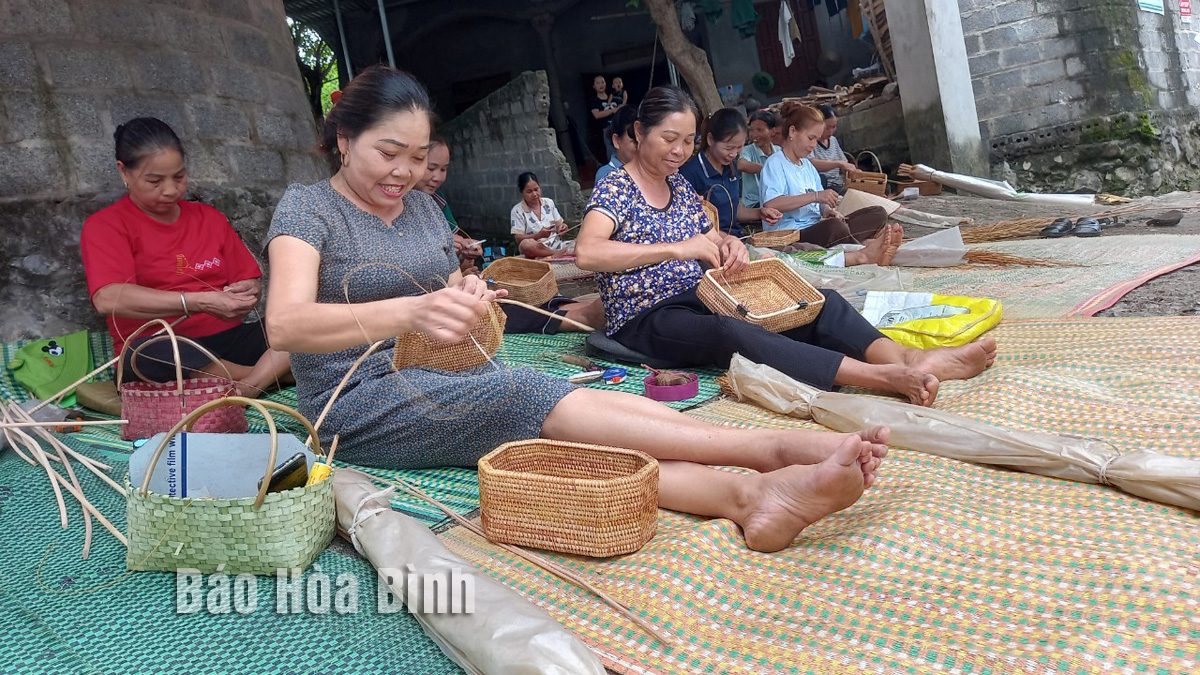
Over recent years, the People's Committee of Lac Son district has implemented various policies to support vocational training in traditional industry cooperatives, especially in ethnic minority areas. As a result, many households have get rid of poverty. Vocational training and startup support projects have also helped create numerous new jobs, increase income for workers, improve living conditions, and create conditions for sustainable development in the ethnic minority areas of the district.

Handicrafts create
jobs for many women in Tre village, Van Nghia commune, Lac Son district.
The culture house in Tre village, Van Nghia commune, Lac Son
district, is now a site for making bamboo and rattan products of the Muong Pheo
Agricultural Trade and Service Cooperative. Every day, about 20 local women
gather here to make handicraft products.
Nguyen Thi Trang in Tre village said that bamboo and rattan
weaving is a traditional craft in the village. In addition to farming, local women
teach each other the craft and then do it. Since the establishment of the
cooperative, they do not have to worry about finding raw materials and selling
products, but just follow the samples. Recently, the demand for handicraft
exports has risen, with increases in orders, so the work has become regular.
For normal workers, in addition to housework, they can each earn 4-5 million
VND (160-200 USD) a month.
Bui Van Lieu, Chairman of the Van Nghia commune People's
Committee, said that currently, the commune has more than 1,600 households with
over 7,000 members whose livelihoods mainly depending on agriculture.
Therefore, expanding the scale of the cooperative, creating jobs, and
increasing income for women are priorities of the locality. The handicraft industry
has generated jobs and helped raise income for many women in the commune. To
encourage the development of cooperatives, local authorities have also created
conditions for them to borrow capital.
In Nhan Nghia commune, the provincial People's Committee in 2017
recognised the Bui traditional craft village, and provided funding to restore
and develop the craft. In 2020, the Bui traditional rattan and bamboo craft
village cooperative was established with 25 members. Since then, local women
have had a more stable source of income, which helps improve their families’
living conditions.
In Hoa Binh province, 11 traditional craft villages with more than 400 small-scaled production households have put in place a clean and green production model, establishing new standards for sustainable development. Waste collection sites and wastewater treatment facilities have been meticulously managed by local residents.
To make it easier for the residents to handle administrative procedures, Yen Bong Commune (Lac Thuy District) has identified the administrative reform as one of its key tasks. By implementing a range of synchronized solutions, the commune has seen the positive changes in the administrative reform, meeting the needs of its people.
Mai Chau district has firmly established itself as a standout destination on Vietnam’s tourism map, attracting both domestic and international visitors with its breathtaking landscapes, rich ethnic culture, and warm hospitality. However, beyond its natural and cultural charm, a secure and well-managed tourism environment has added to Mai Chau’s appeal.
As Vietnam enters a new phase of economic and administrative reform in 2025, Hoa Binh province is stepping up its efforts to streamline governance, boost economic growth, and attract investment.
The Hoa Binh provincial People's Committee held its monthly meeting on March 26 to review the progress of key projects, assess budget revenue and public investment disbursement, provide feedback on draft documents for submission to the provincial Party Committee's Standing Board, and discuss other important matters related to the committee's governance activities.
Playing a key role in Hoa Binh province’s economic development, Luong Son district has been focusing on science and technology development, innovation, and digital transformation.



